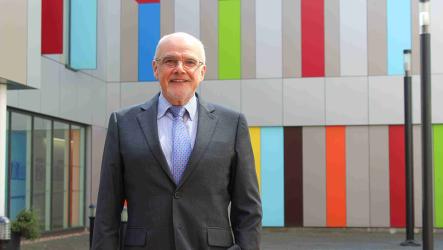Sheffield Professor awarded MBE for national impact to child health

A professor from Sheffield Children's Hospital is being awarded an MBE, having helped save lives across the UK and beyond through the newborn screening. Professor James (Jim) Bonham was a key figure in the introduction of new blood spot screening tests, which help more than 1,000 babies each year by detecting and treating conditions that otherwise could be fatal.
Through his role as President Elect of the International Society of Newborn Screening, Prof Bonham is helping to support and develop similar screening programmes in more than 80 countries around the world. Currently, approximately 25 million babies each year receive this form of screening and many thousands of lives are saved as a result.
Prof Paul Dimitri, Director of Research at Sheffield Children's, said: "Prof Jim Bonham is an inspiration for those working in the fields of paediatrics and newborn screening. He has shown dedication and determination in advancing newborn screening nationally and internationally during his 30 years in the field of inborn errors of metabolism, to ensure that thousands of babies with life debilitating and threatening diseases are detected and treated early in life. His work has no doubt saved and improved the lives of thousands of children.
"Recently Professor Bonham is using his expertise to help develop newborn screening in developing countries, ensuring that services are established and resourced appropriately. By reaching out to other countries desperately in need of newborns screening his work will undoubtedly improve the lives of children worldwide."
Prof Bonham was a Clinical Director at Sheffield Children's until in April 2019. He is also President Elect of the International Society of Newborn Screening and national laboratory lead for the newborn screening blood spot programme. The award for Prof Bonham comes as the blood spot newborn screening programme celebrates 50 years in operation, screening babies across the UK for potentially life threatening conditions.
Prof Bonham said: “It is a really exciting and rewarding time to involved in newborn screening, it has grown significantly in recent years and is set to develop even more rapidly in the future with new forms of technology to identify children who are at risk being developed and new forms of treatment becoming available.
“It is an enormous privilege to be involved in a field of medicine that can bring fresh hope and the possibility of a fulfilling live to so many children both in this country and abroad."
Newborn screening helps prevent serious injury or premature death in those babies who are found to have the conditions and are treated before they become ill. Initially the blood spot programme only screened for a small number of conditions and in 2012 Prof Bonham worked at Sheffield Children's to introduce screening for four additional, potentially life threatening conditions, into routine practice in the UK.
The UK newborn screening programme looks at babies when they’re five days old to find out if they have one of nine rare but serious health conditions. Most babies won't have any of these conditions but, for the few who do, the benefits of screening can be enormous. Early treatment can improve their health, and prevent severe disability or even death.
John Somers, Chief Executive of Sheffield Children's said: "I'm so happy that Jim has received this honour. He's been an incredible supporter of Sheffield Children's and helped develop services at Sheffield Children's, nationally and internationally. He really is leading the way. We're really proud of him and know this honour is truly deserved."
As well as working for Sheffield Children's, Prof Bonham is also a big supporter of The Children's Hospital Charity. He was a trustee for the charity for ten years, stepping down in 2013.
David Vernon-Edwards, Director of The Children's Hospital Charity, added: "Jim is an eminent scientist who has been passionate about advancing children's health for decades, working tirelessly to ensure that children born with health conditions get a better opportunity to lead a full and healthy life.
"He has also been a great ambassador for the hospital and the charity, welcoming our requests for support and encouraging people to support. We're delighted he has been recognised in this way."
